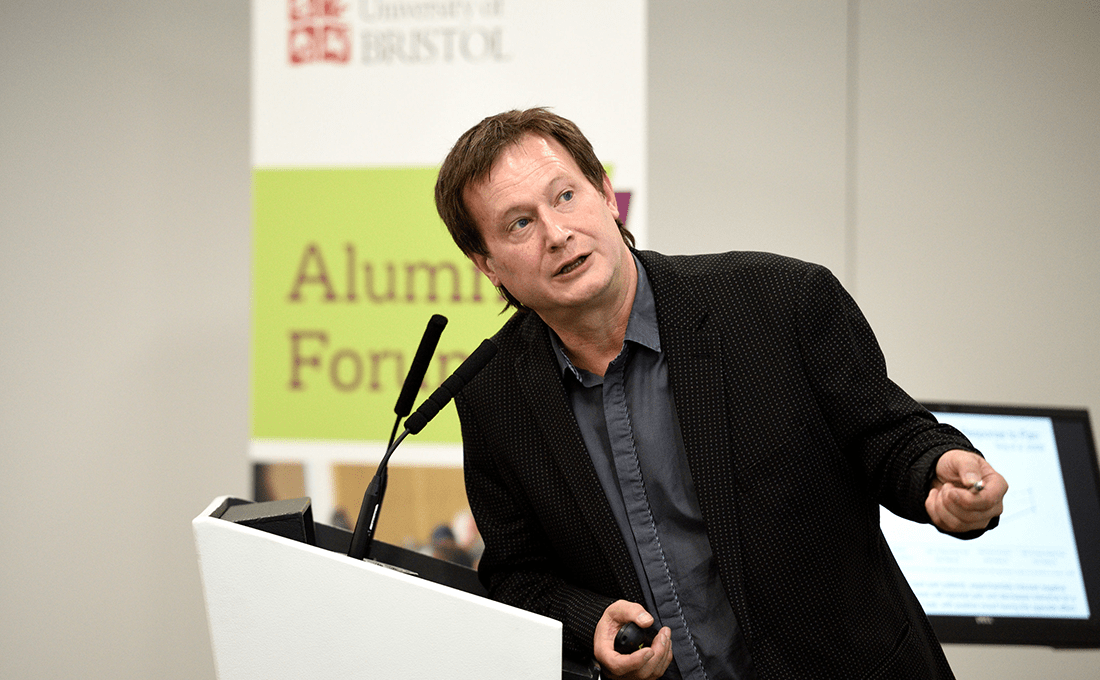
How Professor Bruce Hood is tackling the growing issues in mental health and wellbeing among students at Bristol.
Bruce Hood, Professor of Developmental Psychology in Society, tells us about his Science of Happiness course, which looks at rethinking the way we think, combined with practical applications to think more positively. This applied research project will include contacting participants at regular intervals over three years, to map changes in attitudes and behaviours. Following a successful pilot in 2018, from October 2019 this course will be available to all incoming students at Bristol as an accredited module.
The course is structured to run for 12 weeks as a weekly hour-long lecture by Professor Hood and an additional weekly hour-long peer support hub hosted by a trained mentor. Around 300 students are expected to sign up to the course each term. Rather than focus on assignments or exams, students are expected to do project work, attend their hubs and participate in Happiness Hacks to try them out. Other universities have already expressed interest in working with Bristol and Professor Hood to replicate this programme and a pilot in Bristol schools is happening this autumn.
‘From my own experience in recent years it’s become noticeable that students are no longer coming to me as their tutor to discuss ideas and what interests them in the field of psychology. Rather they are showing up in a state of stress and anxiety about how to get good grades, how to pass their exams, what they need to do to excel. While assessment is of course important it appears it’s taken over and a lot of the joy has disappeared from learning. Stress and anxiety among university students is not new. I wrote a paper over 30 years ago 1 on homesickness in students going to university and how there’s a spike in depression at this time. But it’s becoming a burgeoning problem and people are much more vocal about it now. So why is that?
Fifty-three per cent of students arriving at university have self-reported mental health issues before even getting there
Reasons are multiple. There’s a big shift in what students expect. In the UK school system they’re given such tight direction that they can then struggle when faced with the challenges of independent thinking at university. Uncertainty also leads to stress and we are in a time of peak uncertainty, with factors such as geopolitical instability, climate change and the transition to a digital world. Fifty-three per cent of students arriving at university have self-reported mental health issues before even getting there2 and the latest ONS statistics show that rates of mental health issues are rapidly on the increase.3
So what, if anything, can be done? There’s a belief that people with issues regarding mental health and unhappiness are genetically predisposed to it, but that’s not the full picture. Fifty per cent of what influences happiness is genetic factors, 10 per cent is circumstantial – for example winning the lottery or being the victim of a traffic accident– and 40 per cent is intentional activities such as exercising and getting enough sleep.4 My aim with the Science of Happiness course is to look at misconceptions around happiness, to examine how and why we think the way we do, to get the students to really think long and hard about the true meaning of happiness and how we define it, and then to put the Happiness Hacks into practice.
The intention is that it will make the students taking it more resilient and better able to deal with life
I must stress that this course is not a therapeutic one, although students may benefit by self-reflecting and by participating in the Happiness Hacks. The intention is that it will make the students taking it more resilient and better able to deal with life, understanding that success is not necessarily the same as happiness and that having different moods is important. That said, one interesting factor that emerged from the pilot programme was that the biggest fans of the course were our international students, particularly those from Asia. They often can’t talk about anxiety and stress at home in their culture. But because the Science of Happiness is a science course and looks at data and statistics, they felt ‘allowed’ to attend it and they felt liberated by what they learned.
So what is happiness, how do we define it and how do we achieve it? There are three components to wellbeing and happiness, which are: positive emotions, engagement and living a meaningful life. Psychological science shows that we have misconceptions about happiness, that our expectations around it can be detrimental to us and that certain factors can positively influence our happiness.
This is what I examine with the students taking my course, to overcome biases and put strategies into place to become happier. There are proven benefits to being happy, which have a positive effect on society. Happy people are more productive, more creative, more generous and have better relationships.5 Happiness can even predict health. For instance, a 2017 study showed that if you infect test subjects with the flu virus, the happier people fight it off better.6
Since the end of World War II, GDP has been a country’s measurement of success and one which I believe is possibly the worst way of measuring. We need to think about what’s more valuable to society, because we’re very individualistic in the Western world. We could do well to look at Bhutan, which since 1971 has rejected GDP as the only way to measure progress. In 1972 King Jigme Singye Wangchuck declared that ‘Gross National Happiness is more important than Gross Domestic Product’, giving equal importance to non-economic aspects of wellbeing. We’ve lost track of the real values in life, we have a warped notion of self and we’re not asking ourselves if we feel purposeful and valued. At a time when anxiety and stress are on the increase globally and transecting age brackets and socio-economic backgrounds, refocusing on what Aristotle called Eudaimonia – translated as wellbeing – can only be a good thing.’
Happiness Hacks
Practical ways to feel more positive7.
1. Savouring – taking time to savour the things you enjoy.
2. Gratitude – expressing gratitude for people and things.
3. Social Connection – making real-life connections with strangers.
4. Kindness – increasing your acts of kindness.
5. Exercise – increasing your physical activity.
6. Attention – combat mind wandering.
7. Sleep – ensure at least seven hours per night.
Ellie Wright gives us the student perspective on the Science of Happiness.
References
1 Fisher, S. & Hood, B. (1987). The transition to university: a longitudinal study of psychological disturbance, absent-mindedness and vulnerability to homesickness. British Journal of Psychology, 78, 425-441.
2 Afterline (2018). Union Futures: Being Well, Doing Well [online]. Available at bristolsu.org.uk/articles/being-well-doing-well-results-released [Accessed 10.07.19].
3 Office of National Statistics UK (ONS), 2018. Counts and percentages of adults with a mental illness, by occupation, age, sex and ethnicity, between May and July 2012 to 2017. ONS.
4 Brickman P., Coates D., Janoff-Bulman R. Lottery winners and accident victims – is happiness relative? Journal of Personality and Social Psychology. (1978). 36, 917-927.
5 O’Malley, M. N., & Andrews, L. (1983). The effect of mood and incentives on helping: Are there somethings money can’t buy? Motivation and Emotion, 7(2), 179-189.
6 Ayling K., Fairclough L., Tighe P., Todd I., Halliday V., Garibaldi J., Royal S., Hamed A., Buchanan H., Vedhara K., (2017). Positive mood on the day of influenza vaccination predicts vaccine effectiveness: A prospective observational cohort study. Brain, Behavior, and Immunity.
7 Lyubomirsky, S., King, L., & Diener, E. (2005). The Benefits of Frequent Positive Affect – Does Happiness Lead to Success? Psychological Bulletin, 131, 803-855.


Interesting how similar this is to Yale’s pioneering Science of Happiness course yet no reference is made? I’m glad Bristol are finally realising that this is needed I just hope they make it more widely available- I definitely recommend the online course on coursera, was particularly useful!